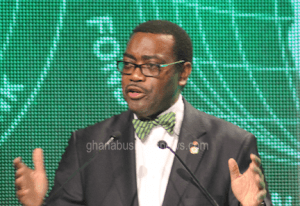Has Akinwumi Adesina shown what to expect of him yet?

Dr. Donald Kaberuka, bowed out of office as the President of the African Development Bank (AfDB) in September 2015 when he handed over to newly elected Dr. Akinwumi Adesina.
Dr. Kaberuka is credited with what are considered the Bank’s remarkable achievements.
The AfDB almost shut down after losing its AAA credit rating in 1995. Omar Kabbaj became Bank President that same year and tightened controls to regain the AAA status.
Kaberuka took over in 2005, and then the Bank made a dramatic turn-around by refocusing on the core needs of its member countries, and re-strategizing.
During his 10-year term from 2005, the Bank’s capital has tripled to $100 billion, and the Bank has made massive investments in development projects around Africa.
Under his tenure the AfDB has collaborated and often competed with other multilateral organizations like the World Bank and International Monetary Fund, working hard to make itself relevant to and ahead in Africa’s economic, social and political development.
Since assuming office as President of the African Development Bank (AfDB) in September 2015, Dr Akinwumi Adesina has laid emphasis on addressing Africa’s energy challenges, and has said on several platforms that it is the key to Africa’s economic growth and development.
“Once you have energy working you release the power of the private sector massively. Africa needs to industrialize and the key to solving that is solving Africa’s energy problem and other infrastructural challenges”
The President has advocated a new paradigm on energy for Africa in which countries will have to commit to increasing the share of GDP they spend on power.
“Without energy, micro, small and medium-sized enterprises which account for over 90 per cent of our businesses operate below capacity, industrialization is stalled and Africa loses 2 to 4 per cent of its GDP. Africa is simply tired of being in the dark. If we get power right we will get everything right in Africa,” Dr Adesina said during a visit to Accra.
Since commencing his tenure, the AfDB approved the Uganda Rural Electricity Access Project, in mid-September 2015, and will provide $71.8 million of the total $87.4 million financing required.
On September 30, it also approved a combined $428.43 million for various projects in eight African countries, of which the Ghana Airports Company Limited received a $120 million loan for construction of a new terminal at the Kotoka International Airport and rehabilitation of other airports at Kumasi, Ho, Tamale and Wa.
Among the projects, $64.93 million was approved for the Gambia River Basin Development Organisation (OMVG) Energy Project, a 128 mw hydropower project which will benefit The Gambia, Guinea-Bissau, Guinea and Senegal.
In December 2015, the AfDB approved financing for at least six energy projects. Among them was €24 million to boost Cameroon’s energy production, $375 million for construction and maintenance of transmission lines in South Africa, $500 million for economic governance and energy support in Egypt, $138 million in loans and grants towards the Ruzizi III hydropower dam which will benefit Burundi, Rwanda and the Democratic Republic of Congo.
But assessing his first 100 days in office, it’s hard to see what he’s got to offer. Sources familiar with the Bank say he hasn’t done one thing he is expected to do yet – that is show that he is in charge. Pressed further, they say, he hasn’t made any appointments yet!
By making appointments, Adesina would be signalling that while he has pledged to continue where his predecessor left, he would do it his way. The act of making new appointments would send a strong signal within the organization that a new leader is in charge indeed, but he hasn’t yet.
Is he being tactful? Well, he couldn’t be tactful by working with old hands. These hands are useful to the organization in so many ways but could still be a threat to his leadership as internal politics in the AfDB can be tense and rough, another source said.
If he is not changing old guards at the management level at headquarters immediately, he is expected by now to have changed some of the Country Representatives, some of whom have long passed their duty times, not to speak of some who could have done much better at post, but have not.
He must also take another look at bureaucracy within the Bank. As the Bank grew over the years, it has increasingly become bureaucratic, often rendering it ineffective in urgent matters. Even though the President is empowered to sort of veto some urgent decisions, streamlining the Bank’s processes should make it less necessary at anytime to require the use of the President’s discretionary powers.
The key role of the Bank in Africa’s development agenda cannot be overemphasised. With the continent confronted with a slowing Chinese economy, low commodity prices and unfair global trade deals, re-energizing the organization to play that role in a more efficient way is urgent.
The Bank must not reflect the typical African systems it is trying to help. Speaking of African systems, what comes to mind is the way African governments conduct business, which in most cases has stagnated the continent rather than accelerated development.
If Adesina would like to leave a legacy that would outlive him, it shouldn’t be business as usual, and he must start acting now.
By Emmanuel K. Dogbevi & Emmanuel Odonkor
